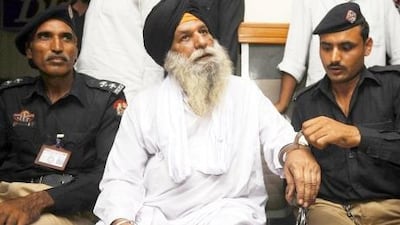WAGAH, India // An Indian man freed after spending three decades in a Pakistani prison for spying walked across the border yesterday into India where he was met by family and hordes of reporters.
"I met my children after 30 years in my country. This is happiness," said Surjeet Singh, 69, who was captured in Pakistan's eastern border areas in the 1980s and handed a death sentence after being convicted on spying charges.
Mr Singh, who was welcomed by Indian officials after walking over the Wagah border crossing in Punjab state, said he had been well treated during his long imprisonment.
Pakistani media had originally reported that the person being released was Sarabjit Singh, a high-profile prisoner who has spent two decades in solitary confinement on death row in Lahore after being convicted for his role in a string of bombings.
Sarabjit Singh's family has campaigned steadily for his release, claiming he is an innocent farmer from Indian Punjab who crossed the border by mistake.
Surjeet Singh told reporters he had met with Sarabjit several times.
"He is allowed to meet other prisoners once a week. He looks healthy but he doesn't say much," he said.
Indian Foreign Minister S M Krishna yesterday said it was time for Sarabjit to be set free.
"I welcome this decision [on Surjeet] and further renew our request to the president of Pakistan to release Sarabjit who has been in custody for well over two decades and is serving a death sentence," Mr Krishna said.
India released an 80-year-old Pakistani doctor last month on humanitarian grounds, after he was convicted of murder and sentenced to life imprisonment following an 18-year-long trial.

